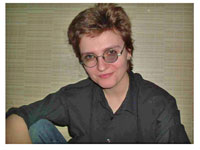 Zinaida Zavyalova of Tomsk University |
A unique collaboration between SUNY Fredonia scholars and a professor from Russia’s Tomsk University is revealing how indigenous cultures in Russia's Tomsk region share similar pressures to those of North American Indians. Tomsk is one of the oldest towns in Siberia and was settled by the Tatars.
Tomsk Professor Zinaida Zavyalova has been working with Edwin D. Lawson, Professor Emeritus of Psychology, and Richard F. Sheil, Professor Emeritus of Music, on studying the Tatars of southeastern Siberia; specifically, how the Russian language impacted their language and naming conventions.
Tomsk University is looking to further the discussion and awarded Professor Zavyalova a grant to visit SUNY Fredonia to lecture and explore faculty and other exchanges. She was a guest on campus earlier this spring.
While here, she participated in “Dialogues on Diversity,” a panel discussion with two teachers of the Seneca language: Andrea Cooke, who teaches the Seneca language and Iroquois studies for the Gowanda School District, and Vince Schiffert, who teaches elementary school children on the Tuscaroran Reservation. Both joined Zavyalova in the discussion of the struggles of indigenous cultures to keep language and culture alive.
Like Seneca, West Siberian Tatar is a non-written language and is rapidly losing fluent speakers.
Professor Zavyalova's research with Dr. Lawson focused on examining the extent of language Russification among Tatars by comparing naming patterns between those who live in villages — where the Tatar language is still spoken — to those who have moved to cities and adopted Russian names. Professor Zavyalova and Dr. Lawson are co-authors of the paper, “The Cultural and Language effects of the Influence of Russian on West Siberian Tatars.” They have also written a dictionary of Tartar names to be published by Tomsk University in Russian and English.
During her visit to Fredonia, Professor Zavyalova presented lectures and also met with various faculty, including Dr. Ted Schwalbe of the Department of Communication and coordinator of International Learning, and Dr. Jack Croxton of the Department of Psychology and director of the Office of Student Creativity and Research, about possible student and faculty exchanges.
After meeting representatives of the Senecas and visiting the Seneca Territory, she noted the many similarities of how indigenous cultures were under pressure from the dominant culture.
Archeological evidence suggests that the Tomsk region has been settled for at least four millennia and that the Tatars inhabited it when it was conquered by Russian Czar Boris Godunov in 1604. The Russian and Tatar populations have long been in interaction which is one reason why Tomsk was selected for this study.



